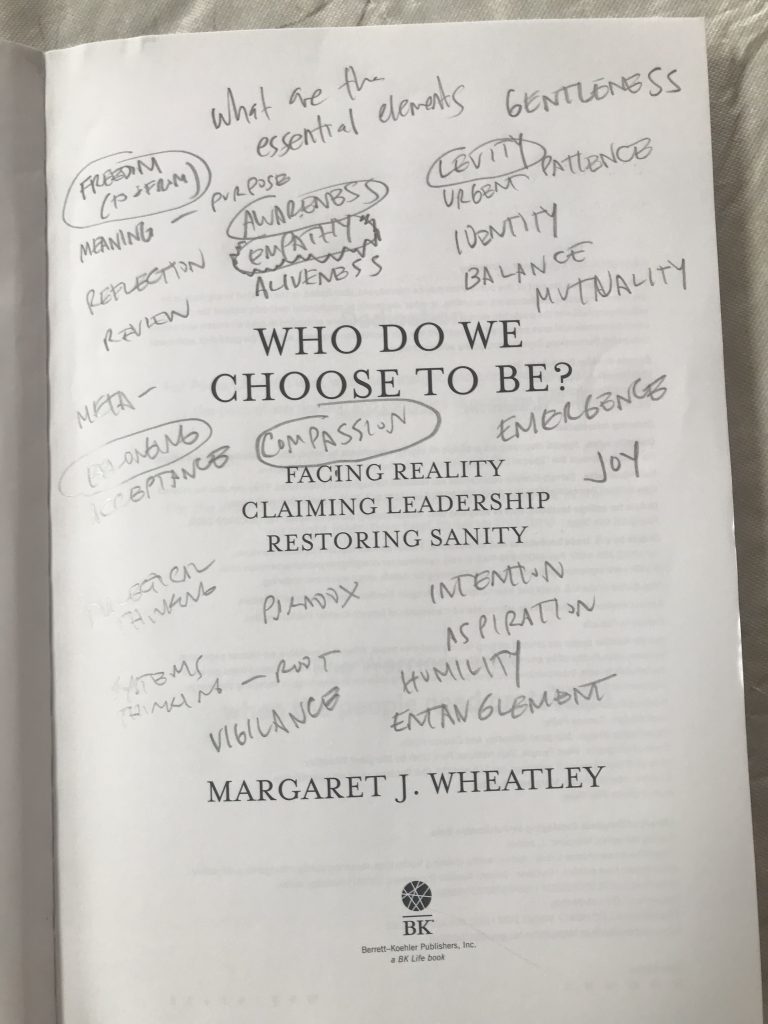What are you wondering about these days? What are you struggling with? What is becoming clear to you?
My answer to all of these questions relates to a new book we’re writing, and to our ongoing search to identify the irreducible elements of identity — the qualities and dispositions that we need in order to preserve, protect, defend, champion, encourage and honor the human spirit (and to do so at this exact moment of decadence, division, and decline).
Towards that end, I just finished Margaret Wheatley’s new book, Who Do We Choose to Be (go read it!), and as I did, I jotted down some of the qualities that I think are element-al to our development of a healthy self and spirit.
As of this moment, these feel all or mostly right to me, meaning they are truly foundational to almost anything else that matters:
BELONGING
AWARENESS
LEVITY
COMPASSION
FREEDOM
JOY
AWE/REVERENCE/UNCERTAINTY/
MEANING
BALANCE
Then there are other qualities I jotted down that make me wonder if they are distinct or actually sub-properties of the former. For example —
HUMILITY (as a product of levity?)
COOPERATION (as an offshoot of belonging?)
VIGILANCE (as an indicator of awareness?)
GENTLENESS (as the inevitable result of compassion?)
And then there is everything else.
What I’m wondering is, what would YOU add, change or modify? Who do you feel we need to become in order to serve as Warriors of the Human Spirit — knowing that, once we have identified them, we can begin to recalibrate our schools, communities and organizations in order to help bring those qualities more fully into being?

Sally Edwards says:
Hi Sam, this post caught my eye, and I felt compelled to respond.
Firstly, I absolutely agree that we need to do something to change schools and how education works. Education globally is at a critical state, it is breaking and hurting our children, and not readying them for the tasks ahead of them.
So what to do to make a difference? How to change education? I wish I had one answer and that it was easy to implement.
I absolutely agree with the concept of fully present self leadership – this is key to the whole process. I suspect that it is not a static process – and one that is more about becoming oneself and uncovering the gem that is beneath layers of rubbish. I suspect there is never a finished product.
Maybe think about states of being and states of doing? These are different. States of being require a more non mind approach. States of doing require the mind to be present. There need to be both – and a way to learn to move between the two, and know when to use one way and not the other. So awareness of the choice and practice of moving between,
I suspect this question is the greatest paradox we face.
warmly
Sally Edwards
Derrick D Willard says:
Sam!
Two things jumped to mind….the top of Maslow’s Hierarchy of Needs…and this quote:
“The most beautiful people we have known are those who have known defeat, known suffering, known struggle, known loss, and have found their way out of the depths. These persons have an appreciation, a sensitivity, and an understanding of life that fills them with compassion, gentleness, and a deep loving concern. Beautiful people do not just happen.”
Dr. Elisabeth Kübler-Ross (Death: The Final Stage of Growth, 1975)
Sam says:
Thanks for weighing in, Sally and Derrick. I like being reminded of the states of being and doing, and of what Dr. Kubler-Ross would counsel. I also like that compassion and gentleness appear in her words as well. Will continue to think on this, and welcome others’ ideas as well . . .
idm says:
You could certainly see your skills in the work you write.
The world hopes for even more passionate writers such as you who aren’t afraid
to mention how they believe. At all times go after your heart.